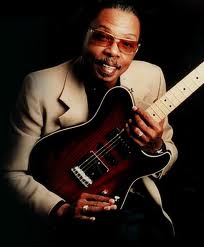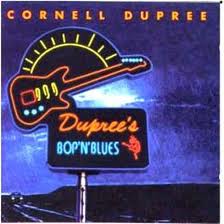“What I consider ‘me’ is a funky blues player.”
From Dupree’s home in Ft. Worth, by phone
August, 1995
Hang on and get ready for a super-funky-blues/soul ride thanks to some truly amazing video. Cornell Dupree, the subject of this interview, is the main man here and it’s a treat to hear and watch him in action: first, on a live clip of him performing “Memphis Soul Stew” with King Curtis’s band, which also features phenomenal drummer Bernard “Pretty” Purdie; and then an hour-long live set from Dupree’s ’70s band Stuff – a taste of heaven for fans of instrumental soul music (I know you’re out there). But it gets even better. Or certainly weirder, in a wonderful way. The rough clip of one of Dupree’s (and Stevie Ray Vaughan’s) mentor, little known guitarist U.P. Wilson, is pure juke joint magnificence, an insanely cool act of blues bravado. And for the finale, meet Windell Capel, an obscure soul showman with a shtick you just got to see.
But back to the interview, which indirectly poses the question, “How do you define ‘guitar god’?” Cornell Dupree did not make Rolling Stone magazine’s list of “100 Guitar Gods” and that’s wrong, though not a surprise. Dupree favored subtlety over flash so he was easy to overlook. But his seat next to Steve Cropper in the small pantheon of soul guitar greats is firm.
Turned out that Dupree’s conversational style resembled his approach to guitar. He chose his words carefully and didn’t say too much. Perhaps he was more reticent than usual because the main topic of our interview was “Bop’n’Blues,” probably the least characteristic of his solo albums and one that nudged him into slightly unusual territory: jazz.
How long ago did you move to Fort Worth?
It’s going on five years now. It’s a lot cheaper to live here than New York, that was mainly the situation. Especially since I stopped working in the studios every day, I was able to stay out and do my concerts, promotions and whatnot and then come back home.
Had you stopped getting as much work?
Not by choice. You live out your play, you might say, and you’re not as busy. It happens to everyone. For a while I was in the studio six, seven days a week. It wears you out. After a while there’s a limit to how many people are going to call you. And nowadays so many of the groups are self-contained. There’s not as much for a sideman in the studios as there once was. I still do occasional sessions, but it’s not like it used to be.
Do you still fly to New York to do sessions?
Yeah.
The bio in your press materials says you’ve played on more than 2500 albums [by the likes of Aretha Franklin, Paul Simon, Joe Cocker, Laura Nyro, Donnie Hathaway, and on and on].
Yeah, that’s fairly accurate.
Did you get ever tired of it?
Yes, you do get burned out, definitely.
Do you have your most memorable recordings, the ones you’re proudest of?
Hmmm, I guess so. The first one that stands out is “Rainy Night in Georgia” with Brook Benton. Then there’s “Live at the Fillmore” [officially known as “Live At Fillmore West’] with Aretha Franklin and “Live at the Bitter End” [officially, simply “Live”] with Donny Hathaway. Those three stand out. There are a few others, but I can’t think of them right now [laughs].
Are you doing many live gigs these day?
Just a few [as leader]. Again, I’m promoting my new CD [“Bop ‘N’ Blues”]. And I work occasionally with [flutist] Herbie Mann. Between him and myself I stay fairly busy, but not busy enough. [Dupree played on one of Mann’s best r&b/funk-oriented albums, 1971’s “Push Push,” which notably included another guitarist, Duane Allman, among its session players.]
The press release for your album says that Herbie [owner of Dupree’s label, Kokopelli] had to talk you into playing bebop on the new album [which includes jazz standards including “Round Midnight” and “Manteca”]. Is that true?
Pretty much. I consider myself basically a rhythm and blues player, and the tunes he came up with were of a jazz nature. I was a little doubtful about how they would work out, but after the tracks were laid and I did my little stuff to it, it came out fairly well I think.
Were you at all uncomfortable?
Well, yeah. I thought about trying to do some bebop jazz, but then I said, “Well, I’m just going to do what I do.” I think it came out pretty well with the spices and the flavors we had together there.
Was it Herbie’s choice of material?
Yeah, he came and had the tunes all picked out [laughs]. It was all his idea.
There are studio guys that can play anything and others that are specialists in a particular thing. What are you?
I pretty much had my thing. I tried to go along with the nature of the music and the ensemble. I tried to lean toward it as best I could, but with my own attitude, my own flavor. I used my own vocabulary, or you might say diction. So I leaned, but I was still firm with myself.
You had jazz experience before this album, right?
Yeah, I was on dates with Stanley Turrentine, Grover Washington, Hank Crawford. But again, I played me. What I consider me is a funky blues player. But we mixed together and it came out fine.
So now you’re back living in Ft. Worth, where you grew up. Is Ft. Worth where you started playing music? Did you have mentors there who showed you the ropes?
Yeah, in the area there were a couple of gentlemen who were around when I was growing up. One was Huary Wilson [better known as U.P. Wilson].
Another was Edward Franklin. They were good players. I used to go sit in with them and they’d show me different little licks and things. They weren’t jazz players, they played rhythm and blues.
How’d you get from Texas to New York?
There was a time when King Curtis came through here, I was about 18. He sat in with the band I was working with. He told me, “You keep practicing and one day I’ll send for you.” About a year to the day later, he did. That’s how I arrived in New York.
Was it just luck?
It was. It was a misfortune for him. There was a death in the family and he happened to know the people who ran the club and he just dropped by to do a little jamming.
Would you say King Curtis was your mentor?
Definitely so. I got my college degree from him [laughs].
What happened to Stuff [an instrumental band of New York session aces that included Dupree, bassist Gordon Edwards, keyboardist Richard Tee, drummers Steve Gadd and Christopher Parker and guitarist Eric Gale]?
It did fall apart. Everybody was very independent and not committed to the gig itself. They were out doing other things. But it was one of the best groups, period, that I will ever work in. The ingredients were all there for good music. But everybody was going there own way and we didn’t have the best management, so that was that.
And then there was the death of Eric Gale [in May, 1994].
We were very close. I was also close to Richard Tee [who died in July, 1993], so that was the end of it right there.
In the liner notes to your new album, Jerry Wexler says he was able to stop using multiple guitarists on his Atlantic Records sessions because you could play rhythm and lead at the same time.
Basically. I try to support whomever is out front.
How did you work it in Stuff with you and Eric Gale both switching between lead and rhythm?
The phenomenal thing was we never rehearsed, never practiced, never said a thing about how we were going to play and we never tripped over each other’s feet. Everything somehow came out okay and balanced out every time.
Your playing as a sessionman is subtle and self-effacing. You don’t use the guitar to go on an ego trip. But does that make it hard to make the transition to leader?
No. Again, I just pretty much play what comes to mind, stay with the feeling of the song and try to get the song across. Be yourself and play what comes natural rather than press or try to impress someone.
Who’s in your band?
Chuck Rainey on bass, Eric Parker, drums, Etienne Stadwijk, piano, Ronnie Cuber, baritone sax, Terell Stafford on trumpet and Bobby Watson on alto. There’s a lot of history there with me and Chuck. Eric is the younger brother of Chris Parker from Stuff. He’s like a young clone.
Do you miss living in New York?
Yeah, I do miss New York. But it’s comfortable here. All the excitement is gone. I just go in, do my little number, get recharged, and then come back to Texas and relax.
Your last album [1991’s “Can’t Get Through”] had a really good soul singer on it, Windell Capel [on “Let the Sun Shine On Me Again”]. Whatever happened to him?
I really don’t know. I’d love to have him come around and do some things with me, but I guess not. The truth is, we were in the studio doing the album when I came out and walked about four blocks and he was on the street with a little cassette player playing and singing. I said, “You wanna make a record?” Sure enough, he did. I discovered him right there on 52nd Street and Broadway in New York with a little bucket full of money. He’s singing and I said, “Well, look at this.”
Do you think you’ll stick with Herbie’s label?
Possibly. If they treat me right. They seem to be doing a nice job. Hopefully we’ll be together for a little while.
[Kokopelli released one more album by Dupree, “Uncle Funky,” in 1998, the same year the label went out of business. Dupree died in his home in Ft. Worth on May 8, 2011, while waiting for a lung transplant he needed as a result of suffering from emphysema. He was 68.]

